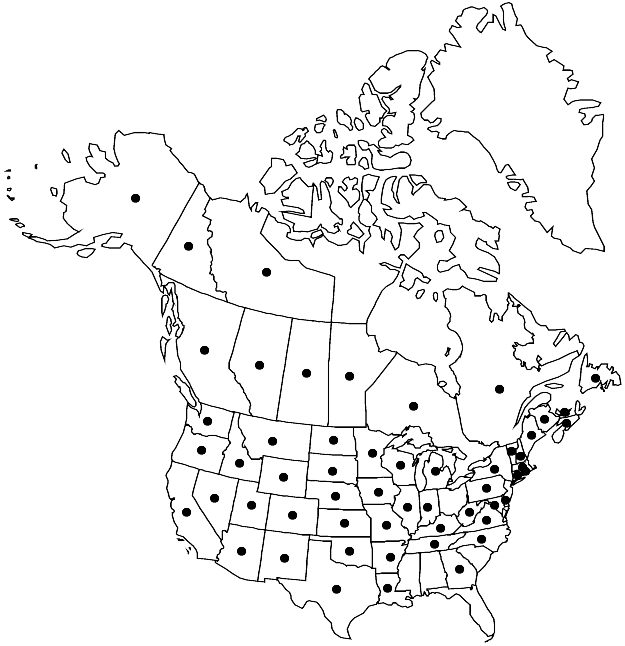Difference between revisions of "Descurainia sophia"
in H. G. A. Engler and K. Prantl, Nat. Pflanzenfam. 55(III,2): 192. 1891.
FNA>Volume Importer |
imported>Volume Importer |
||
| (2 intermediate revisions by 2 users not shown) | |||
| Line 1: | Line 1: | ||
{{Treatment/ID | {{Treatment/ID | ||
|accepted_name=Descurainia sophia | |accepted_name=Descurainia sophia | ||
| − | |accepted_authority=(Linnaeus) Webb ex | + | |accepted_authority=(Linnaeus) Webb ex Prantl |
|publications={{Treatment/Publication | |publications={{Treatment/Publication | ||
|title=in H. G. A. Engler and K. Prantl, Nat. Pflanzenfam. | |title=in H. G. A. Engler and K. Prantl, Nat. Pflanzenfam. | ||
| Line 8: | Line 8: | ||
}} | }} | ||
|common_names=Flixweed;tansy mustard | |common_names=Flixweed;tansy mustard | ||
| + | |special_status={{Treatment/ID/Special_status | ||
| + | |code=W | ||
| + | |label=Weedy | ||
| + | }}{{Treatment/ID/Special_status | ||
| + | |code=I | ||
| + | |label=Introduced | ||
| + | }} | ||
|basionyms={{Treatment/ID/Basionym | |basionyms={{Treatment/ID/Basionym | ||
|name=Sisymbrium sophia | |name=Sisymbrium sophia | ||
| Line 42: | Line 49: | ||
|elevation=0-3000 m | |elevation=0-3000 m | ||
|distribution=Alta.;B.C.;Man.;N.B.;Nfld. and Labr. (Nfld.);N.W.T.;N.S.;Ont.;P.E.I.;Que.;Sask.;Yukon;Alaska;Ariz.;Ark.;Calif.;Colo.;Conn.;Del.;D.C.;Ga.;Idaho;Ill.;Ind.;Iowa;Kans.;Ky.;La.;Maine;Mass.;Mich.;Minn.;Mo.;Mont.;Nebr.;Nev.;N.H.;N.Mex.;N.Y.;N.C.;N.Dak.;Okla.;Oreg.;Pa.;R.I.;S.Dak.;Tenn.;Tex.;Utah;Vt.;Va.;Wash.;W.Va.;Wis.;Wyo.;Eurasia;introduced also in Mexico;Central America;South America;South Africa;Australia. | |distribution=Alta.;B.C.;Man.;N.B.;Nfld. and Labr. (Nfld.);N.W.T.;N.S.;Ont.;P.E.I.;Que.;Sask.;Yukon;Alaska;Ariz.;Ark.;Calif.;Colo.;Conn.;Del.;D.C.;Ga.;Idaho;Ill.;Ind.;Iowa;Kans.;Ky.;La.;Maine;Mass.;Mich.;Minn.;Mo.;Mont.;Nebr.;Nev.;N.H.;N.Mex.;N.Y.;N.C.;N.Dak.;Okla.;Oreg.;Pa.;R.I.;S.Dak.;Tenn.;Tex.;Utah;Vt.;Va.;Wash.;W.Va.;Wis.;Wyo.;Eurasia;introduced also in Mexico;Central America;South America;South Africa;Australia. | ||
| + | |introduced=true | ||
|discussion=<p>Deviant chromosome counts (e.g., 2n = 12, 14, 20, 38; see R. C. Rollins 1993, N. H. Holmgren 2005b, S. I. Warwick and I. A. Al-Shehbaz 2006) are most certainly erroneous, and the species appears to be exclusively tetraploid based on x = 7.</p> | |discussion=<p>Deviant chromosome counts (e.g., 2n = 12, 14, 20, 38; see R. C. Rollins 1993, N. H. Holmgren 2005b, S. I. Warwick and I. A. Al-Shehbaz 2006) are most certainly erroneous, and the species appears to be exclusively tetraploid based on x = 7.</p> | ||
|tables= | |tables= | ||
| Line 54: | Line 62: | ||
-->{{#Taxon: | -->{{#Taxon: | ||
name=Descurainia sophia | name=Descurainia sophia | ||
| − | |authority=(Linnaeus) Webb ex | + | |authority=(Linnaeus) Webb ex Prantl |
|rank=species | |rank=species | ||
|parent rank=genus | |parent rank=genus | ||
| Line 68: | Line 76: | ||
|publication title=in H. G. A. Engler and K. Prantl, Nat. Pflanzenfam. | |publication title=in H. G. A. Engler and K. Prantl, Nat. Pflanzenfam. | ||
|publication year=1891 | |publication year=1891 | ||
| − | |special status= | + | |special status=Weedy;Introduced |
| − | |source xml=https:// | + | |source xml=https://bitbucket.org/aafc-mbb/fna-data-curation/src/2e0870ddd59836b60bcf96646a41e87ea5a5943a/coarse_grained_fna_xml/V7/V7_835.xml |
|tribe=Brassicaceae tribe Descurainieae | |tribe=Brassicaceae tribe Descurainieae | ||
|genus=Descurainia | |genus=Descurainia | ||
Latest revision as of 22:36, 5 November 2020
Annuals; eglandular; sparsely to densely pubescent, sometimes glabrous distally, trichomes dendritic. Stems erect, unbranched or branched distally, (1–)2–7(–10) dm. Basal leaves: petiole 0.1–2(–3) cm; blade 2- or 3-pinnate, ovate or oblong to obovate in outline, to 15 cm, lateral lobes linear or oblong, (to 10 × 2 mm), margins entire. Cauline leaves sessile or shortly petiolate; blade smaller distally, distal lobes often narrower, surfaces often glabrous. Racemes considerably elongated in fruit. Fruiting pedicels divaricate to ascending, straight, (5–)8–15(–20) mm. Flowers: sepals erect to ascending, yellowish, oblong, 1.8–2.8 mm, glabrate to sparsely pubescent; petals narrowly oblanceolate, 2–3 × 0.4–0.6 mm; median filaments 2–3 mm; anthers 0.3–0.4 mm. Fruits divaricate-ascending to erect, narrowly linear, torulose, (12–)15–27(–30) × 0.5–0.8(–1) mm, (straight or curved upward); valves each with distinct midvein; septum with a broad central longitudinal band appearing as 2 or 3 veins; ovules 20–48 per ovary; style obsolete, 0.05–0.2 mm, glabrous. Seeds uniseriate, reddish brown, oblong, 0.7–1.3 × 0.3–0.6 mm. 2n = 28.
Phenology: Flowering Mar–Jul.
Habitat: Roadsides, waste places, disturbed sites, railroad embankments, hillsides, mountain slopes, canyon bottoms, stream banks, fields, lawns, pastures, deserts, sagebrush and pinyon-juniper communities
Elevation: 0-3000 m
Distribution

Introduced; Alta., B.C., Man., N.B., Nfld. and Labr. (Nfld.), N.W.T., N.S., Ont., P.E.I., Que., Sask., Yukon, Alaska, Ariz., Ark., Calif., Colo., Conn., Del., D.C., Ga., Idaho, Ill., Ind., Iowa, Kans., Ky., La., Maine, Mass., Mich., Minn., Mo., Mont., Nebr., Nev., N.H., N.Mex., N.Y., N.C., N.Dak., Okla., Oreg., Pa., R.I., S.Dak., Tenn., Tex., Utah, Vt., Va., Wash., W.Va., Wis., Wyo., Eurasia, introduced also in Mexico, Central America, South America, South Africa, Australia.
Discussion
Deviant chromosome counts (e.g., 2n = 12, 14, 20, 38; see R. C. Rollins 1993, N. H. Holmgren 2005b, S. I. Warwick and I. A. Al-Shehbaz 2006) are most certainly erroneous, and the species appears to be exclusively tetraploid based on x = 7.